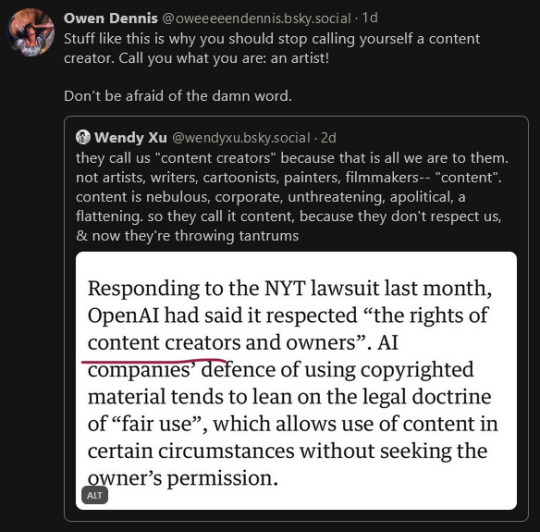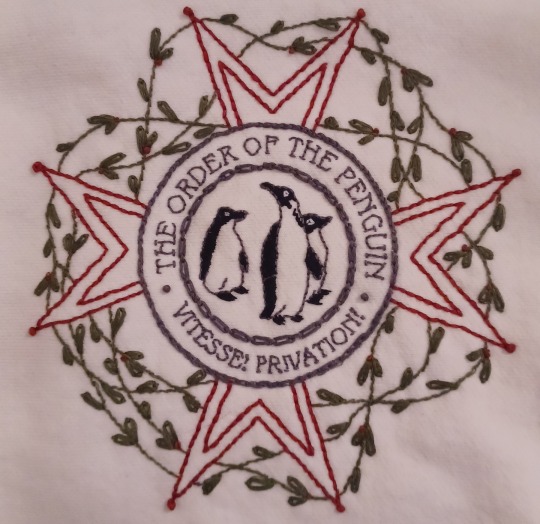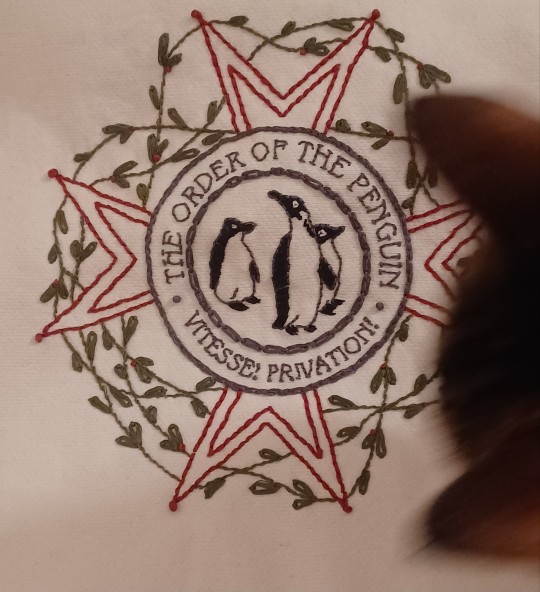#blocking orders
Explore tagged Tumblr posts
Text
Every internet fight is a speech fight

THIS WEEKEND (November 8-10), I'll be in TUCSON, AZ: I'm the GUEST OF HONOR at the TUSCON SCIENCE FICTION CONVENTION.

My latest Locus Magazine column is "Hard (Sovereignty) Cases Make Bad (Internet) Law," an attempt to cut through the knots we tie ourselves in when speech and national sovereignty collide online:
https://locusmag.com/2024/11/cory-doctorow-hard-sovereignty-cases-make-bad-internet-law/
This happens all the time. Indeed, the precipitating incident for my writing this column was someone commenting on the short-lived Brazilian court order blocking Twitter, opining that this was purely a matter of national sovereignty, with no speech dimension.
This is just profoundly wrong. Of course any rules about blocking a communications medium will have a free-speech dimension – how could it not? And of course any dispute relating to globe-spanning medium will have a national sovereignty dimension.
How could it not?
So if every internet fight is a speech fight and a sovereignty fight, which side should we root for? Here's my proposal: we should root for human rights.
In 2013, Edward Snowden revealed that the US government was illegally wiretapping the whole world. They were able to do this because the world is dominated by US-based tech giants and they shipped all their data stateside for processing. These tech giants secretly colluded with the NSA to help them effect this illegal surveillance (the "Prism" program) – and then the NSA stabbed them in the back by running another program ("Upstream") where they spied on the tech giants without their knowledge.
After the Snowden revelations, countries around the world enacted "data localization" rules that required any company doing business within their borders to keep their residents' data on domestic servers. Obviously, this has a human rights dimension: keeping your people's data out of the hands of US spy agencies is an important way to defend their privacy rights. which are crucial to their speech rights (you can't speak freely if you're being spied on).
So when the EU, a largely democratic bloc, enacted data localization rules, they were harnessing national soveriegnty in service to human rights.
But the EU isn't the only place that enacted data-localization rules. Russia did the same thing. Once again, there's a strong national sovereignty case for doing this. Even in the 2010s, the US and Russia were hostile toward one another, and that hostility has only ramped up since. Russia didn't want its data stored on NSA-accessible servers for the same reason the USA wouldn't want all its' people's data stored in GRU-accessible servers.
But Russia has a significantly poorer human rights record than either the EU or the USA (note that none of these are paragons of respect for human rights). Russia's data-localization policy was motivated by a combination of legitimate national sovereignty concerns and the illegitimate desire to conduct domestic surveillance in order to identify and harass, jail, torture and murder dissidents.
When you put it this way, it's obvious that national sovereignty is important, but not as important as human rights, and when they come into conflict, we should side with human rights over sovereignty.
Some more examples: Thailand's lesse majeste rules prohibit criticism of their corrupt monarchy. Foreigners who help Thai people circumvent blocks on reportage of royal corruption are violating Thailand's national sovereignty, but they're upholding human rights:
https://www.vox.com/2020/1/24/21075149/king-thailand-maha-vajiralongkorn-facebook-video-tattoos
Saudi law prohibits criticism of the royal family; when foreigners help Saudi women's rights activists evade these prohibitions, we violate Saudi sovereignty, but uphold human rights:
https://www.bbc.com/news/world-middle-east-55467414
In other words, "sovereignty, yes; but human rights even moreso."
Which brings me back to the precipitating incidents for the Locus column: the arrest of billionaire Telegram owner Pavel Durov in France, and the blocking of billionaire Elon Musk's Twitter in Brazil.
How do we make sense of these? Let's start with Durov. We still don't know exactly why the French government arrested him (legal systems descended from the Napoleonic Code are weird). But the arrest was at least partially motivated by a demand that Telegram conform with a French law requiring businesses to have a domestic agent to receive and act on takedown demands.
Not every takedown demand is good. When a lawyer for the Sackler family demanded that I take down criticism of his mass-murdering clients, that was illegitimate. But there is such a thing as a legitimate takedown: leaked financial information, child sex abuse material, nonconsensual pornography, true threats, etc, are all legitimate targets for takedown orders. Of course, it's not that simple. Even if we broadly agree that this stuff shouldn't be online, we don't necessarily agree whether something fits into one of these categories.
This is true even in categories with the brightest lines, like child sex abuse material:
https://www.theguardian.com/technology/2016/sep/09/facebook-reinstates-napalm-girl-photo
And the other categories are far blurrier, like doxing:
https://www.kenklippenstein.com/p/trump-camp-worked-with-musks-x-to
But just because not every takedown is a just one, it doesn't follow that every takedown is unjust. The idea that companies should have domestic agents in the countries where they operate isn't necessarily oppressive. If people who sell hamburgers from a street-corner have to register a designated contact with a regulator, why not someone who operates a telecoms network with 900m global users?
Of course, requirements to have a domestic contact can also be used as a prelude to human rights abuses. Countries that insist on a domestic rep are also implicitly demanding that the company place one of its employees or agents within reach of its police-force.
Just as data localization can be a way to improve human rights (by keeping data out of the hands of another country's lawless spy agencies) or to erode them (by keeping data within reach of your own country's lawless spy agencies), so can a requirement for a local agent be a way to preserve the rule of law (by establishing a conduit for legitimate takedowns) or a way to subvert it (by giving the government hostages they can use as leverage against companies who stick up for their users' rights).
In the case of Durov and Telegram, these issues are especially muddy. Telegram bills itself as an encrypted messaging app, but that's only sort of true. Telegram does not encrypt its group-chats, and even the encryption in its person-to-person messaging facility is hard to use and of dubious quality.
This is relevant because France – among many other governments – has waged a decades-long war against encrypted messaging, which is a wholly illegitimate goal. There is no way to make an encrypted messaging tool that works against bad guys (identity thieves, stalkers, corporate and foreign spies) but not against good guys (cops with legitimate warrants). Any effort to weaken end-to-end encrypted messaging creates broad, significant danger for every user of the affected service, all over the world. What's more, bans on end-to-end encrypted messaging tools can't stand on their own – they also have to include blocks of much of the useful internet, mandatory spyware on computers and mobile devices, and even more app-store-like control over which software you can install:
https://pluralistic.net/2023/03/05/theyre-still-trying-to-ban-cryptography/
So when the French state seizes Durov's person and demands that he establish the (pretty reasonable) minimum national presence needed to coordinate takedown requests, it can seem like this is a case where national sovereignty and human rights are broadly in accord.
But when you consider that Durov operates a (nominally) encrypted messaging tool that bears some resemblance to the kinds of messaging tools the French state has been trying to sabotage for decades, and continues to rail against, the human rights picture gets rather dim.
That is only slightly mitigated by the fact that Telegram's encryption is suspect, difficult to use, and not applied to the vast majority of the communications it serves. So where do we net out on this? In the Locus column, I sum things up this way:
Telegram should have a mechanism to comply with lawful takedown orders; and
those orders should respect human rights and the rule of law; and
Telegram should not backdoor its encryption, even if
the sovereign French state orders it to do so.
Sovereignty, sure, but human rights even moreso.
What about Musk? As with Durov in France, the Brazilian government demanded that Musk appoint a Brazilian representative to handle official takedown requests. Despite a recent bout of democratic backsliding under the previous regime, Brazil's current government is broadly favorable to human rights. There's no indication that Brazil would use an in-country representative as a hostage, and there's nothing intrinsically wrong with requiring foreign firms doing business in your country to have domestic representatives.
Musk's response was typical: a lawless, arrogant attack on the judge who issued the blocking order, including thinly veiled incitements to violence.
The Brazilian state's response was multi-pronged. There was a national blocking order, and a threat to penalize Brazilians who used VPNs to circumvent the block. Both measures have obvious human rights implications. For one thing, the vast majority of Brazilians who use Twitter are engaged in the legitimate exercise of speech, and they were collateral damage in the dispute between Musk and Brazil.
More serious is the prohibition on VPNs, which represents a broad attack on privacy-enhancing technology with implications far beyond the Twitter matter. Worse still, a VPN ban can only be enforced with extremely invasive network surveillance and blocking orders to app stores and ISPs to restrict access to VPN tools. This is wholly disproportionate and illegitimate.
But that wasn't the only tactic the Brazilian state used. Brazilian corporate law is markedly different from US law, with fewer protections for limited liability for business owners. The Brazilian state claimed the right to fine Musk's other companies for Twitter's failure to comply with orders to nominate a domestic representative. Faced with fines against Spacex and Tesla, Musk caved.
In other words, Brazil had a legitimate national sovereignty interest in ordering Twitter to nominate a domestic agent, and they used a mix of somewhat illegitimate tactics (blocking orders), extremely illegitimate tactics (threats against VPN users) and totally legitimate tactics (fining Musk's other companies) to achieve these goals.
As I put it in the column:
Twitter should have a mechanism to comply with lawful takedown orders; and
those orders should respect human rights and the rule of law; and
banning Twitter is bad for the free speech rights of Twitter users in Brazil; and
banning VPNs is bad for all Brazilian internet users; and
it’s hard to see how a Twitter ban will be effective without bans on VPNs.
There's no such thing as an internet policy fight that isn't about national sovereignty and speech, and when the two collide, we should side with human rights over sovereignty. Sovereignty isn't a good unto itself – it's only a good to the extent that is used to promote human rights.
In other words: "Sovereignty, sure, but human rights even moreso."

If you'd like an essay-formatted version of this post to read or share, here's a link to it on pluralistic.net, my surveillance-free, ad-free, tracker-free blog:
https://pluralistic.net/2024/11/06/brazilian-blowout/#sovereignty-sure-but-human-rights-even-moreso

Image: © Tomas Castelazo, www.tomascastelazo.com (modified) https://commons.wikimedia.org/wiki/File:Border_Wall_at_Tijuana_and_San_Diego_Border.jpg
CC BY-SA 4.0 https://creativecommons.org/licenses/by-sa/4.0/
#speech#free speech#free expression#crypto wars#national sovereignty#elon musk#twitter#blocking orders#pavel durov#telegram#lawful interception#snowden#data localization#russia#brazil#france#cybercrime treaty#bernstein#eff#malcolm turnbull#chat control
121 notes
·
View notes
Text


"content creator" is a corporate word.
we are artists.
#anti ai#fuck ai#artists on tumblr#please do not call me or any artist a content creator#i'm an artist. a fanartist. a designer. but not a content creator#ai clowns in my replies will be deleted and blocked without response so do not waste your breath#you are not an 'artist' for generating an image any more than you are a chef for ordering from a restaurant. someone Else did the work.#owen dennis just deleted all his blue sky stuff again and i hate that he does that because he makes such interesting comments#about the entertainment industry lmao i need to just. start screenshotting every smart thing he says#anyway thats why i decided to finally make this when its been sitting in drafts for a few months#owen dennis#edit - if you dont know who owen dennis is he's the creator of one of the best animated series of the last 20 years (Infinity Train)#he's very open about talking about art and the entertainment/animation industry on social media and in his newsletter and hes so cool 4 it
9K notes
·
View notes
Text

A judge has temporarily blocked President Trump’s order to end birthright citizenship.
Judge Coughenour, a Reagan appointee, said:
“I've been on the bench for over four decades. I can’t remember another case where the question presented is as clear as this one. This is a blatantly unconstitutional order.”
4K notes
·
View notes
Text
Nazi Germany lasted for ~10 years. the US' genocide of indigenous people inspired the Nazis, and we've been at it for ~500 years. 55 MILLION indigenous turtle Islanders were killed by American colonialists. Tell me again why we're arguing over whether or not these bourgeois politicians are 99% Hitler? This country is far worse than the Nazis were even remotely capable of. There are nearly 1.8 MILLION people in Slavery in the United States right now. This country is cartoon levels of evil, and beyond that! it's beyond parody! it's worse than you can possibly imagine. and that's just two examples over the 500 years they've been at this, and they only domestically! Do you have any idea what the ruling class has done in other countries? the war and famine they've intentionally induced from profits? The millions they've bombed? The only country to ever use nuclear bombs! and it was on civilians!
So yes, of course we cry out death to [US]America. Do you seriously not understand how deeply deeply evil this country is? Again:
Death to the USA
#us politics#death to america#death to the USA#i know most people outside of the USA understand this (to varying extents) but by god people in the imperial core need to realize how bad#it is like i cannot express it#anyway block tagged as us politics bc again this is mostly smth imperial core-ers need to hear#also its likely far more indigenous people were killed let alone are being killed right now#but i dont think we have to get into numbers arguments to understand the order of magnitudes
2K notes
·
View notes
Text


















#btsgif#btsedit#bts#kim namjoon#namjoon#*#*gifs#*knj#*bts#250610#weverse live#if anyone says anything out of order in tags you are getting blocked. i don't want to see anything.#if you are not capable of empathy then stay away from this set i'm dead serious.
286 notes
·
View notes
Text


Hello MCSM community
#when your fixation has like 0 merch so you gotta do everything yourself#ive been wanting to make the mc flowers out of wooden blocks. then i got the absolute big brained idea to make the order's amulet and. yeah#my crafts#minecraft story mode#mcsm#mcsm amulet#crafts#arts and crafts#my art
622 notes
·
View notes
Text

Shoving pipes up Benreys ass again sorry
#repurposed the fountain print#the outflow keeps blowing duckweed everywhere so i nuked 95% of it and threw him in as an airstone bubble block#also mossball guardian because it keeps rolling outta sight#hlvrai#UPDATE: hes floating. i ordered new rocks this mf getting glued#Goin for that red layered canyony rock and praying they give me enough for an arch but not enough that it's gon get heavy af#it's an aqua one aspire tank with lil legs which is a stupid fucking idea it makes me so fucking anxious the base will cave in
2K notes
·
View notes
Text










arrival on jedha
#alt angles#i love unlocking the campfire scene#unfortunately the fire is blocking so many good pictures#and then it just disappears close to the end?#cal’s face during the spamel ride is really stupid#i have bloopers#I love merrical they make me ill#cal kestis#nightsister merrin#merrical#calmerrin#jedi survivor#bd 1#merrin#photo mode#sorry for the hiatus i also met cameron!#jedi fallen order#star wars jedi fallen order#star wars jedi survivor#jedha
410 notes
·
View notes
Text


putting kunsel in the og ffvii because it's what he deserves
#sir! the blorbo backport operation was a success#also the materia isn't just silly random colors. i did in fact actually consider what he should have. in order from left->right:#twin stinger: enemy skill (big guard; white wind)+magic efficiency; steadfast block+provoke#shinra alpha: subversion+warding; binding+magnify; assess+synergy#i actually am not sure if the subversion+warding combo disables the curse ring's instant death countdown#but it would be SICK AF if it did#anyway yea he's tanky support build with high defense stats but his damage output is giving 'middle schooler with a pool noodle' vibes#but it's ok because he's an annoying unkillable mfer with a sexy sword so it all balances out#ffvii#kunsel#my art <3
254 notes
·
View notes
Text
mcsm art dump :))






#whoo another round of block people posting#minecraft story mode#mcsm#mcsm harper#mcsm pama#mcsm order of the stone#mcsm petra#mcsm jesse#mcsm olivia#mcsm axel#mcsm lukas#mcsm radar
420 notes
·
View notes
Text

finished my order of the penguins embroidery project!! (ft. my other assistant, briseis)


most of my progress pics also involve achilles being a menace. he did NOT want me to finish this project lol





#i'm so happy with how it turned out#and how the cable chain stitches look after going thru the wash#honestly they might look better than when i first stitched them#it's such a weird bittersweet feeling finishing one of these projects because it's like#yippee!! new shirt that i made myself and is so cool#but also damn i don't have a project to do anymore#anyway uhm. i have no idea if anyone would be interested but like#i would not be opposed to making either of these designs again#either on a t-shirt sweatshirt or tote bag#OR i just need to make a new design and make smth else for myself :3#orrrrrr maybe i should try getting out of my writers block slump#we shall see!!#for now look at my embroidery boy#belgica expedition#the order of the penguin#<- apparently not a tag anyone on tumblr uses lol#georges lecointe#roald amundsen#frederick cook#begrudgingly tagging the other two members of the order like I DID NOT MAKE THIS FOR YOU TWO but whatever#polar exploration#embroidery#fiber art#figs sillies#polar tag
150 notes
·
View notes
Text




the jerma cinematic universe
what if they were weird brothers
#drawings#jerma#jerma985#jerma fanart#catboy jerma#jex#posted in the same order i drew them... i feel like u can see the art block lifting#or at least i can#the last one felt like the first like. normal drawing ive done in forever#also idk why drawing ponies always breaks my art block kdsjghsd i havent really even seen much of the show#its just fun for character design :p
268 notes
·
View notes
Text
By The Associated Press and AZFamily Digital News Staff
Published: Jun. 13, 2025 at 6:59 AM MST|Updated: 38 minutes ago
ATLANTA (AP/AZFAMILY) — A federal judge on Friday blocked President Donald Trump’s attempt to overhaul elections in the U.S., siding with a group of Democratic state attorneys general who challenged the effort as unconstitutional.
The Republican president’s March 25 executive order sought to compel officials to require documentary proof of citizenship for everyone registering to vote for federal elections, accept only mailed ballots received by Election Day and condition federal election grant funding on states adhering to the new ballot deadline.
The attorneys general, including Arizona Attorney General Kris Mayes, said the directive “usurps the States’ constitutional power and seeks to amend election law by fiat.” The White House defended the order as “standing up for free, fair and honest elections” and called proof of citizenship a “commonsense��� requirement.
Judge Denise J. Casper of the U.S. District Court in Massachusetts said in Friday’s order that the states had a likelihood of success as to their legal challenges.
157 notes
·
View notes
Text
HARUGUMI 🌸 ashi style!
haru / natsu / aki / fuyu



#one quarter of the way there!!!!#still easing out of art block and i thought it’d be fun to revisit and draw all the mankai boys#but like within a certain frame of time so it’s consistent#🙇 i’ve been doing one of these per day so hopefully i can finish it off in 12 days#SO FAR ITS BEEN SUPER FUN. i’ve also been rating the experiences#cuz at the end of it all i wanna do a tierlist based on how fun they are to draw……..#so far massu is in the lead w a score of. 8? I THINK?#it’s a fun exercise and super simple i’m having loads of funsies. and they don’t take too long!!!!#dunno if i’ll reblog or do separate posts for other troupes……. ohaur well tis for later#ALSOS. ya they’re in a random order#a3!#a3#a3! act addict actors#a3! art#a3! fanart#harugumi#spring troupe#sakuya sakuma#sakuma sakuya#masumi usui#usui masumi#tsuzuru minagi#minagi tsuzuru#itaru chigasaki#chigasaki itaru#citron a3!#a3! citron#chikage utsuki#utsuki chikage#ashipiko draws ♪
194 notes
·
View notes
Text
"Papa," Heinrich bounded into the room, proudly brandishing a small, wooden practice sword, "look what uncle Henry taught me!"
Little Heinrich screwed his face up in concentration, swinging his sword as hard as he could. The force of his swing meant he span around on the spot and landed on his bottom, looking up at his father sheepishly. Hans just nodded.
"That looks like Henry's work, alright."
Jitka looked up from her embroidery, smiling fondly at her son, "I thought we agreed no swordplay inside."
"Does that apply to wrestling, too?" Heinrich asked, getting to his feet. Jitka nodded.
"Of course."
"Sorry, Papa," Heinrich said sincerely, shaking his head, "you and uncle Henry can't wrestle in his bedroom anymore."
Heinrich left his parents to stare at each other blankly in shocked silence. Hans cleared his throat, slowly turning the page in his book.
"He was...showing me a new move."
Jitka gave a tired sigh, "mm, I bet he was."
more heinrich fics
#I think another hunting trip is in order 😬#hansry#henry x hans#hans x henry#kingdom come deliverance#kingdom come deliverance 2#henry lying on the bed: what are you doing? / hans crouched at the keyhole trying to block it: ....nothing#my writing#heinrich and his two dads
122 notes
·
View notes
Text


my vision for fishing one's design and STARFISH DOODLES 🗣🗣🗣🗣
#in stars and time#isat#in stars and time fanart#isat siffrin#fishing one#isat fishing one#starfish#isat starfish#fishersif#artilite#artilite doodle#THAT'S RIGHT. THEY'RE BACK.#THE FISHING ONE!!!#I DON'T PLAY AROUND W/ MY NPCS#fishing one.. save me.... save me fishing one.......#sorry for so much radio silence#literally just forgot to post my art#oops!#i got caught up in trying to consolidate some doodles#and posting things in order#but that brain block is BROKEN. i smashed it
550 notes
·
View notes